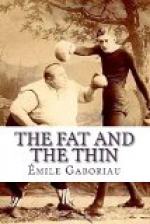“This gentleman, it seems, has just come from a distance,” said she. “He feels quite lost in your scampish Paris. I dare say you might be of service to him.”
Then she at last took her departure, feeling pleased at having left the two men together. Claude looked at Florent with a feeling of interest. That tall, slight, wavy figure seemed to him original. Madame Francois’s hasty presentation was in his eyes quite sufficient, and he addressed Florent with the easy familiarity of a lounger accustomed to all sorts of chance encounters.
“I’ll accompany you,” he said; “which way are you going?”
Florent felt ill at ease; he was not wont to unbosom himself so readily. However, ever since his arrival in Paris, a question had been trembling on his lips, and now he ventured to ask it, with the evident fear of receiving an unfavourable reply.
“Is the Rue Pirouette still in existence?”
“Oh, yes,” answered the artist. “A very curious corner of old Paris is the Rue Pirouette. It twists and turns like a dancing girl, and the houses bulge out like pot-bellied gluttons. I’ve made an etching of it that isn’t half bad. I’ll show it to you when you come to see me. Is it to the Rue Pirouette that you want to go?”
Florent, who felt easier and more cheerful now that he knew the street still existed, declared that he did not want to go there; in fact, he did not want to go anywhere in particular. All his distrust awoke into fresh life at Claude’s insistence.
“Oh! never mind,” said the artist, “let’s go to the Rue Pirouette all the same. It has such a fine colour at night time. Come along; it’s only a couple of yards away.”
Florent felt constrained to follow him, and the two men walked off, side by side, stepping over the hampers and vegetables like a couple of old friends. On the footway of the Rue Rambuteau there were some immense heaps of cauliflowers, symmetrically piled up like so many cannonballs. The soft-white flowers spread out like huge roses in the midst of their thick green leaves, and the piles had something of the appearance of bridal bouquets ranged in a row in colossal flower stands. Claude stopped in front of them, venting cries of admiration.
Then, on turning into the Rue Pirouette, which was just opposite, he pointed out each house to his companion, and explained his views concerning it. There was only a single gas lamp, burning in a corner. The buildings, which had settled down and swollen, threw their pent-houses forward in such wise as to justify Claude’s allusion to pot-bellied gluttons, whilst their gables receded, and on either side they clung to their neighbours for support. Three or four, however, standing in gloomy recesses, appeared to be on the point of toppling forward. The solitary gas lamp illumined one which was snowy with a fresh coat of whitewash, suggesting some flabby broken-down old dowager, powdered and bedaubed in the hope of appearing young. Then the others stretched away into the darkness, bruised, dented, and cracked, greeny with the fall of water from their roofs, and displaying such an extraordinary variety of attitudes and tints that Claude could not refrain from laughing as he contemplated them.




